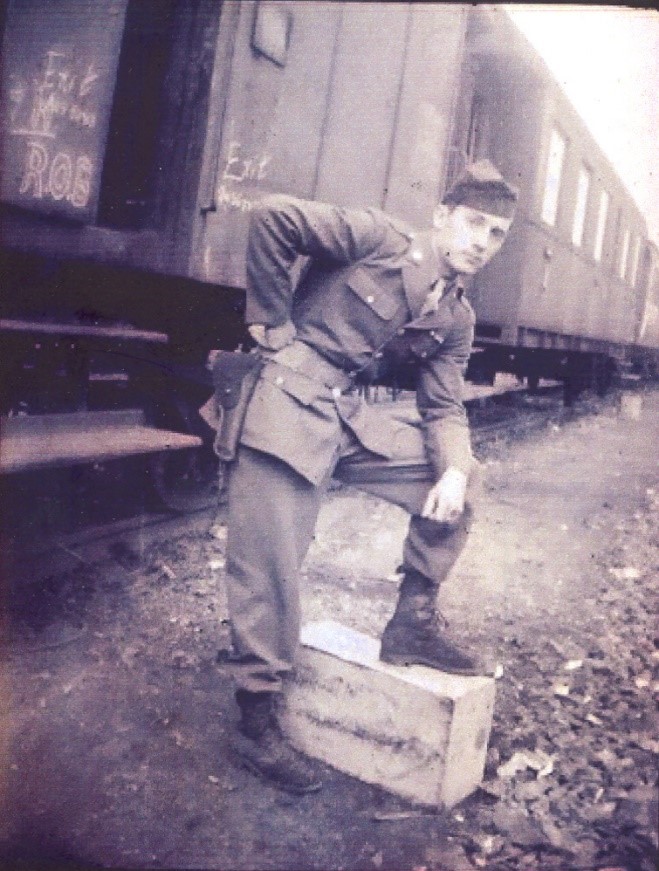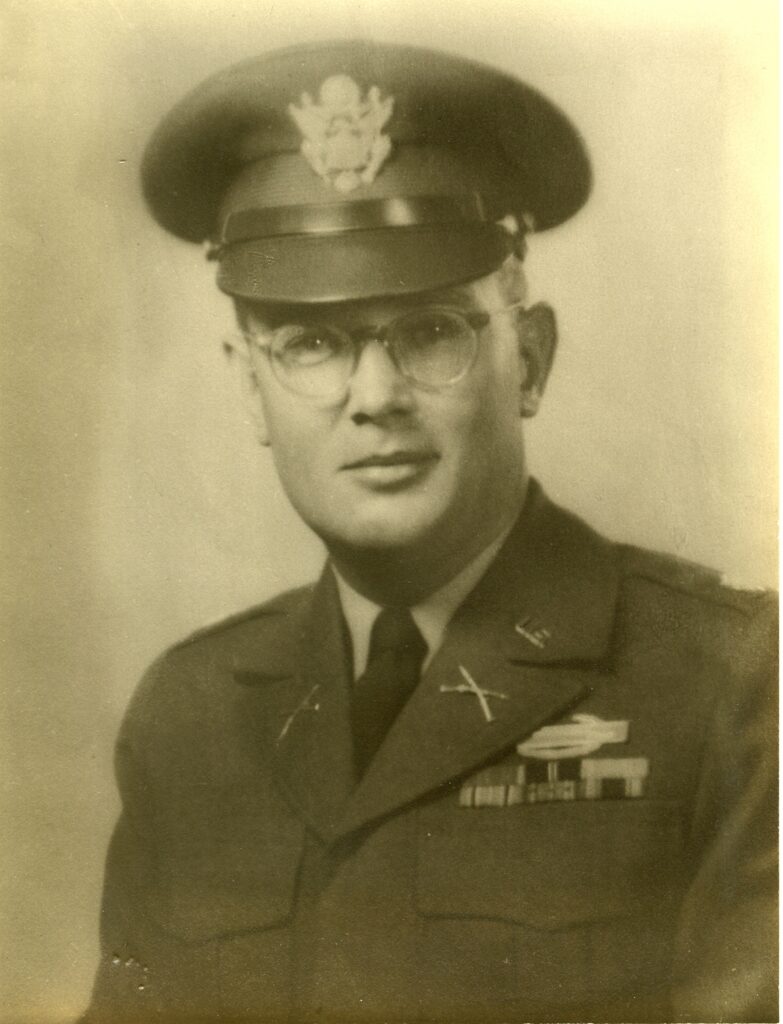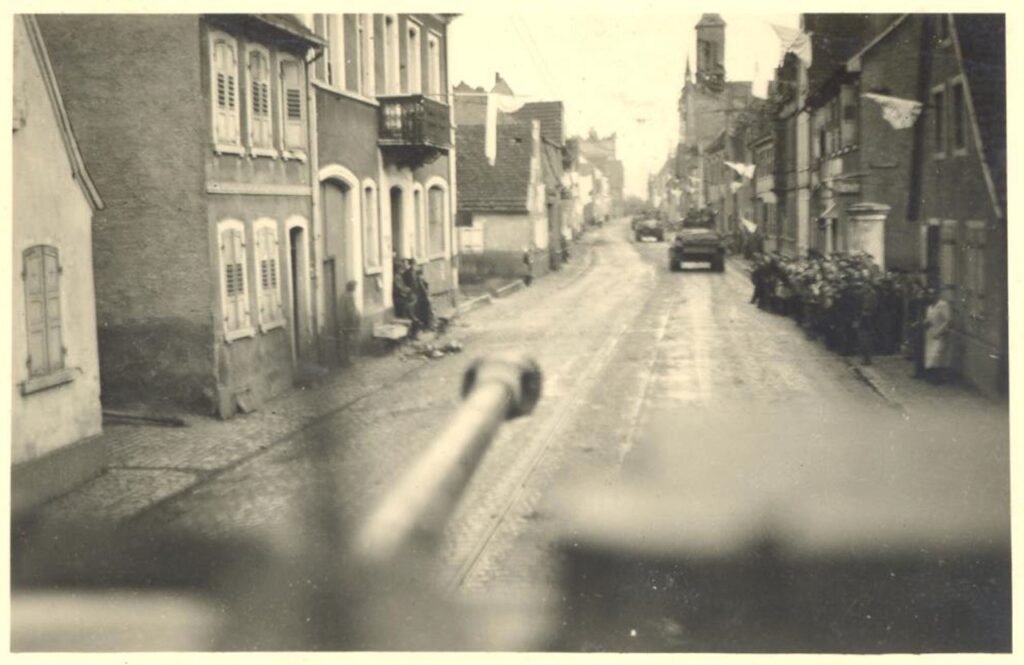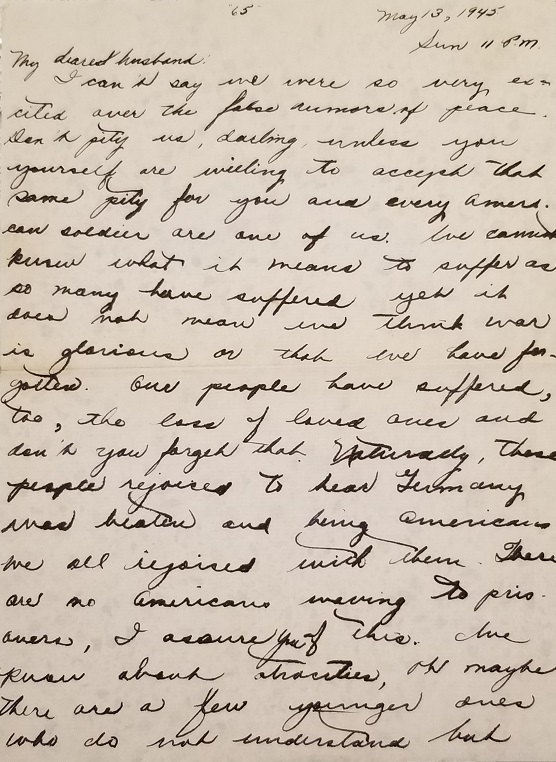
The newspapers and radio stations announced the news on May 8, 1945. “V-E Officially Proclaimed!” The Associated Press boldly stated, “The Allies proclaimed today the unconditional surrender of Germany. President Truman announcing ‘a solemn but glorious hour,’ set next Sunday as a day of Thanksgiving but reminded, ‘our blows will continue until the Japanese lay down their arms in unconditional surrender.”
Seventy-five years later, it is easy to imagine that V-E Day was just a day of celebration for both the troops in Europe and the families on the home front. For weeks, there had been a sense of the war winding down, but no one was certain when it would actually end. Once victory was official, the soldiers felt relief, but did not know when they would return home or what lay ahead for them beyond the victory in Europe. Would they serve on occupation duty or would they head to the war in Japan?
American soldiers served for the duration and the end of the war was not always so clear. Back in 1943, one soldier wrote that he expected to be home by 1947. However, by January 1945, victory in the Bulge had ended Hitler’s final blitzkrieg. By spring, there was a feeling that the end of the war in Europe was finally near, though rumors and confusion were common. On April 10, Giles McGinty of the 127th AAA Gun Bn. wrote to his wife that “You never know what paper or person to believe,” and that he “bet the war would be over within 50 days.”
Vincent Winter, of the 735th Railway Operating Battalion, wrote to his wife about a premature celebration in the railyards. “For the first time over here I feel like the war might be over. I haven’t read a newspaper for so long, and haven’t heard a radio either, but last night May 4 at 9:20 pm in this large ruined city of Germany somebody hollered, ‘The war’s over.’ In the yard where my caboose was, all the engine whistles, 45 automatics, 03 rifles, switchmen’s horns and flares were going full blast. At 9:25 pm just five minutes later, the roundhouse started all engine whistles and pistols. At 9:30 pm, the whole town sounded like the front lines. I’m telling you the tears ran right down my face as all I thought of then was you. It was a feeling I’ll never be able to explain, but I was happy. No one knows for sure yet if the war is really over.”
On May 5, Preston Searle wrote to his wife from France, “I guess by the time you get this letter the war will be over on this side. There have been some very favorable reports lately. Can’t see how it can last very much longer. Right now I’d say it will be over within the next 48 hours.”
As the fighting stopped on May 7, Jackie Higgins of General Patton’s Third Army summarized the feelings of many soldiers when he wrote to his parents. “Today the war here finished. I can’t seem to grasp it. This stillness is as bad as all the noise. It seems like a great weight on one’s shoulder that can’t be shook off. Yes I’m well, not a scratch through it all. Only my soul is battle scarred. I’m much thinner, but I feel fine. The weather here today was beautiful, the first nice day in weeks. I think God arranged it that way. No one seems to know what is going to happen. I’m just praying.”
On May 8, Henry Triesler of the Fifth Army, in Italy, wrote home to his family in Hagerstown, Maryland. “Today we heard the news. The beaten Wehrmacht has surrendered. Tonight there is no celebration. This is being taken so quietly, because the speedy end has been inevitable.”
Some soldiers in the Pacific expressed concern that people on the home front would quit their war jobs now that the fighting in Europe had ceased. The Editor of the Norfolk Ledger-Dispatch stated, “The nation and our allies cannot possibly forget that the defeat of Germany is only part of a duty to which we have committed ourselves. A job remains to be done. A price remains to be paid.”
People on the home front generally received the news of peace very stoically and wondered what would be next for their loved ones overseas. Maggie Searle wrote to her husband Preston on May 6, “So, do you think you’ll get to come home? To stay? Furlough? Pacific? Occupation? Write me a long letter and tell me some things.”
On May 13, Maggie reminded Preston of some of the hardships of the home front. “Our people have suffered too, the loss of loved ones, and don’t you forget that. Naturally, the people rejoiced to hear Germany was beaten. American women want to help. Prices are high here Preston, terribly high. The ordinary middle class men and women make just enough to make ends meet; butter is a luxury, eggs are scarce, to mention a few. Sure, we all complain, but who gives you your guns, your planes, your tanks, your ammunition, and even the clothes on your back? I don’t want to hear any more talk about your people failing you. I thought you had more sense than that. I’ll do my celebrating when I feel your arms around me once again.”
Labor leaders encouraged American workers to keep up the fight. AFL President William Green implored workers by stating, “American soldiers of production cannot afford to pause or falter until the entire job is completed and final victory achieved.” CIO President Philip Murray said, “The courage, patience and superb fighting qualities of our sons and brothers in the fighting forces must still be backed up on the home front. This is no time to quit buying war bonds. For many months yet ahead of us, we must help to meet the payrolls and to pay the food and supply bills of those great fighters of whom we are so justly proud.”
Acting Senate Democratic Leader Hill (Ala) pronounced, “This is a day when you and I and every American can sincerely rejoice… The defeat of the Nazi is an achievement made possible by the unity of freedom-loving peoples. Let us give thanks to the God of our fathers that He has given us the strength and the courage to defeat one of the enemy that sought the destruction of our way of life and the enslavement of our people.”
V-E Day was complicated and those who lived through it experienced a variety of emotions. President Truman celebrated his 61st birthday. Sporting events in the United States took place, unlike on D-Day. The soldiers reflected on their war experiences and wondered what was next. On the home front, Americans quietly celebrated and longed for the day when their loved ones would return home. Many continued to work in the factories and invest in bonds during the 7th and final bond drive. Some soldiers remained on duty in occupied Europe. Others prepared for the invasion of Japan that thankfully never occurred. Mainly, the generation that liberated Europe, just wanted to come home.
Written by James Triesler, BOBA member and Director of Education, Virginia War Memorial

Major Henry Triesler, 5th Army in Italy 
Street scenes of a German town with white surrender flags hanging out of windows. Photo from Frank Chupashka of the 10 ARMD. 
Vincent Winter of the 735th Railway Operating Battalion. 
First page of letter Maggie Searle wrote on May 13, 1945